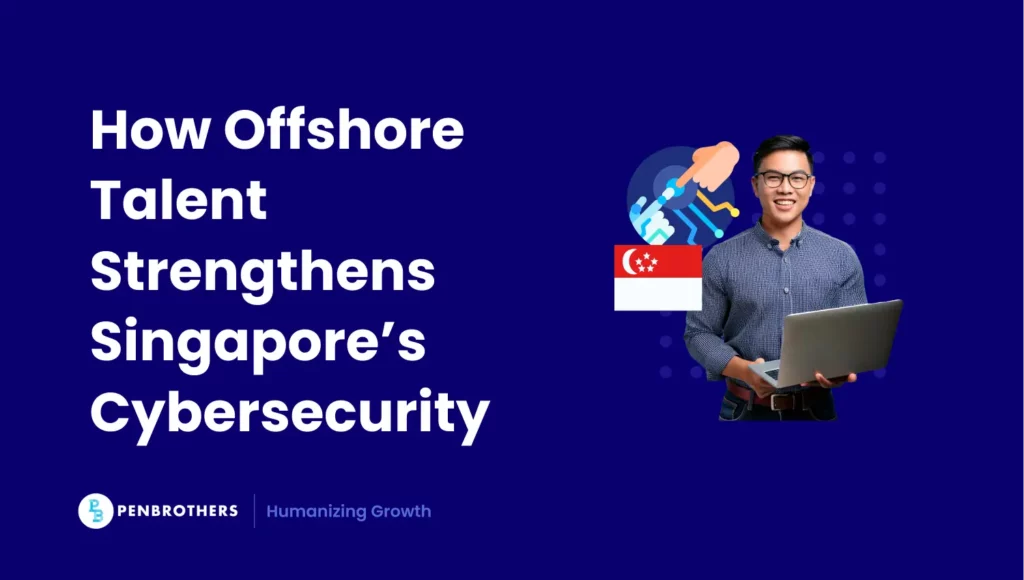Why Cybersecurity Matters for Singapore’s Tech Industry
Singapore, a global hub for technology and finance, is increasingly vulnerable to sophisticated cyber threats. As digital transformation accelerates, so do the risks of cyberattacks targeting financial institutions, e-commerce platforms, and government systems. The consequences are dire—financial loss, reputational damage, and regulatory penalties.
Adding to the complexity is the ever-evolving cyber threat landscape. Malware, ransomware, and phishing attacks have become more frequent and advanced, leaving no organization immune. According to Verizon’s 2024 DBIR, organizations experienced 10,626 confirmed breaches out of 30,458 incidents analyzed across 94 countries, thus, the demand for skilled cybersecurity professionals is skyrocketing. Unfortunately, local talent shortages have made addressing these challenges difficult for Singaporean companies.
Offshore cybersecurity talent is emerging as a solution to bridge this critical gap, offering the expertise and scalability tech companies need to fortify their defenses.
Related: HR Outsourcing Singapore: Scale Faster With Payroll, Compliance, and HR Advisory
The Cybersecurity Talent Shortage in Singapore
Despite Singapore’s commitment to nurturing a tech-savvy workforce, the local supply of cybersecurity professionals falls short of industry needs. Key challenges include:
- Talent scarcity: The demand for cybersecurity experts has outpaced the availability of qualified professionals. According to the Cyber Security Agency of Singapore (CSA), Singapore requires an additional 1,000 cybersecurity professionals annually to meet industry demand.
- High operational costs: Maintaining in-house teams, including salaries, training, and technology investments, can be prohibitively expensive for many firms.
- Regulatory pressures: Companies must adhere to strict compliance frameworks, requiring specialized expertise that may not be readily available in-house.
To address this gap, the CSA has launched the Cybersecurity Talent, Innovation & Growth (Cyber TIG) Plan, committing S$50 million over three years to uplift the sector’s capabilities. However, the immediate need for skilled professionals remains urgent.
How Offshore Talent Solves the Problem
Offshore cybersecurity talent offers a practical and cost-efficient solution to Singapore’s tech companies. Key advantages include:
- Access to expertise: Offshore providers bring diverse, specialized knowledge in threat detection, penetration testing, and compliance management.
- Cost efficiency: Companies save significantly on operational costs by outsourcing instead of building in-house teams.
- 24/7 monitoring: Offshore teams provide round-the-clock surveillance, ensuring immediate responses to emerging threats.
- Scalability and flexibility: Offshore providers can adapt to the evolving needs of tech companies, whether scaling up during high-risk periods or focusing on specific tasks like vulnerability assessments. Here’s how to build an effective offshore team.
This approach aligns with the Asia-Pacific region’s cybersecurity spending growth, projected to reach USD 36 billion in 2024, reflecting the increasing prioritization of security investments.
Cybersecurity Roles That Are Ideal for Outsourcing + Cost Comparison
Outsourcing allows companies to access a wide range of cybersecurity roles and services, including:
Threat Intelligence Analyst
Collects and analyzes data on emerging threats to anticipate potential cyberattacks. Monitors dark web activities, malware trends, and threat actor behavior to provide actionable insights for proactive defense.
| Philippine Annual Salary: | SGD 26,683 |
| Singapore Annual Salary: | SGD 145,200 |
Incident Response Specialist
Responds to cybersecurity incidents, containing and mitigating threats to minimize damage. Investigates breaches, restores systems, and develops strategies to prevent recurrence.
| Philippine Annual Salary: | SGD 31,841 |
| Singapore Annual Salary: | SGD 163,350 |
Penetration Tester (Ethical Hacker)
Simulates cyberattacks to identify vulnerabilities in systems, networks, and applications. Helps organizations strengthen defenses before real attackers exploit weaknesses.
| Philippine Annual Salary: | SGD 28,402 |
| Singapore Annual Salary: | SGD 151,250 |
Security Operations Center (SOC) Analyst
Monitors networks and systems 24/7 to detect, analyze, and respond to security incidents. Identifies and mitigates threats in real time.
| Philippine Annual Salary: | SGD 23,243 |
| Singapore Annual Salary: | SGD 133,100 |
Compliance and Governance Specialist
Ensures adherence to cybersecurity laws, regulations, and industry standards such as GDPR, SOC 2, or ISO 27001. Manages audits and maintains security documentation.
| Philippine Annual Salary: | SGD 24,963 |
| Singapore Annual Salary: | SGD 145,200 |
Cloud Security Specialist
Focuses on securing cloud-based infrastructure and applications. Configures security measures, monitors cloud environments, and ensures data protection in public, private, or hybrid clouds.
| Philippine Annual Salary: | SGD 28,402 |
| Singapore Annual Salary: | SGD 163,350 |
Vulnerability Management Specialist
Identifies, evaluates, and prioritizes vulnerabilities in systems and applications. Works with IT teams to apply patches and implement mitigation strategies.
| Philippine Annual Salary: | SGD 21,524 |
| Singapore Annual Salary: | SGD 139,150 |
Data Protection Officer (DPO)
Manages data privacy and protection, ensuring compliance with regulations like GDPR. Oversees policies and practices to safeguard sensitive data from breaches and misuse.
| Philippine Annual Salary: | SGD 31,841 |
| Singapore Annual Salary: | SGD 181,500 |
Cybersecurity Project Manager
Manages the implementation of security projects, including upgrades, policy rollouts, and compliance initiatives. Coordinates teams and ensures projects meet deadlines and budgets.
| Philippine Annual Salary: | SGD 33,561 |
| Singapore Annual Salary: | SGD 187,550 |
Identity and Access Management (IAM) Specialist
Designs and manages systems that control user access to sensitive information and resources. Implements authentication protocols, monitors access logs, and prevents unauthorized access.
| Philippine Annual Salary: | SGD 24,963 |
| Singapore Annual Salary: | SGD 151,250 |
Offshore Staffing Calculator
Discover the total cost of hiring with Penbrothers and compare it with the costs in your country.
Discover the pricing for each specialization
Select the job position and country
Philippines as a Top Offshore Destination for Singapore’s Cybersecurity Needs
The Philippines has firmly established itself as a leading destination for outsourcing cybersecurity services, driven by several key advantages:
- Skilled Workforce: The country boasts a large pool of certified cybersecurity professionals with expertise in advanced technologies such as AI-driven threat detection and blockchain security.
- Cost Efficiency: With labor costs significantly lower than those in Western markets and neighboring countries like Singapore, the Philippines offers a cost-effective solution without compromising quality. For instance, outsourcing services to the Philippines can save businesses up to 80% compared to maintaining an in-house team in Singapore.
- Cultural and Time Zone Alignment: The Philippines’ strong cultural affinity with Western and Asian markets, coupled with its proximity to Singapore, ensures seamless collaboration. The country’s time zone is only one hour ahead of Singapore, facilitating real-time communication and operational efficiency.
Additionally, the Philippine government’s support for the IT-BPM sector includes tax incentives and infrastructure development, further solidifying the country’s position as an outsourcing powerhouse.
By leveraging Filipino talent, companies gain access to reliable, high-quality services tailored to their unique needs, enhancing their cybersecurity resilience.
Building a Future-Proof Cybersecurity Strategy with Offshore Talent
Offshore talent is not just a temporary fix but a cornerstone of a sustainable cybersecurity strategy. Key considerations include:
- Proactive Threat Management: Offshore teams continuously monitor and preempt potential cyberattacks, leveraging advanced analytics and threat intelligence systems to stay ahead of emerging risks. Learn more about cybersecurity for remote teams.
- Cost Sustainability: Outsourcing significantly reduces overheads associated with hiring, training, and retaining in-house teams. This allows businesses to allocate resources more effectively toward innovation and core activities.
- Agility: Offshore providers offer the flexibility to scale operations up or down based on business needs. Their ability to quickly adopt and implement emerging technologies, such as AI-powered cybersecurity tools, ensures companies remain competitive in a dynamic threat landscape.
Furthermore, initiatives like the CyberSG Talent, Innovation, and Growth Collaboration Centre, a joint effort by the Cyber Security Agency of Singapore and the National University of Singapore, highlight the importance of combining local and offshore talent to create a resilient cybersecurity ecosystem.
Offshore Talent for Cybersecurity Success
Singapore’s tech companies face unparalleled cybersecurity challenges, but offshore talent provides a viable path forward. By outsourcing critical functions, businesses gain access to expertise, cost savings, and scalability, ensuring robust defenses against ever-evolving threats.
Penbrothers stands ready to help companies navigate this journey, offering tailored solutions that align with their goals. Explore the benefits of outsourcing cybersecurity today and secure your company’s future.
Connect with Penbrothers for a consultation and discover how offshore talent can transform your cybersecurity strategy.






